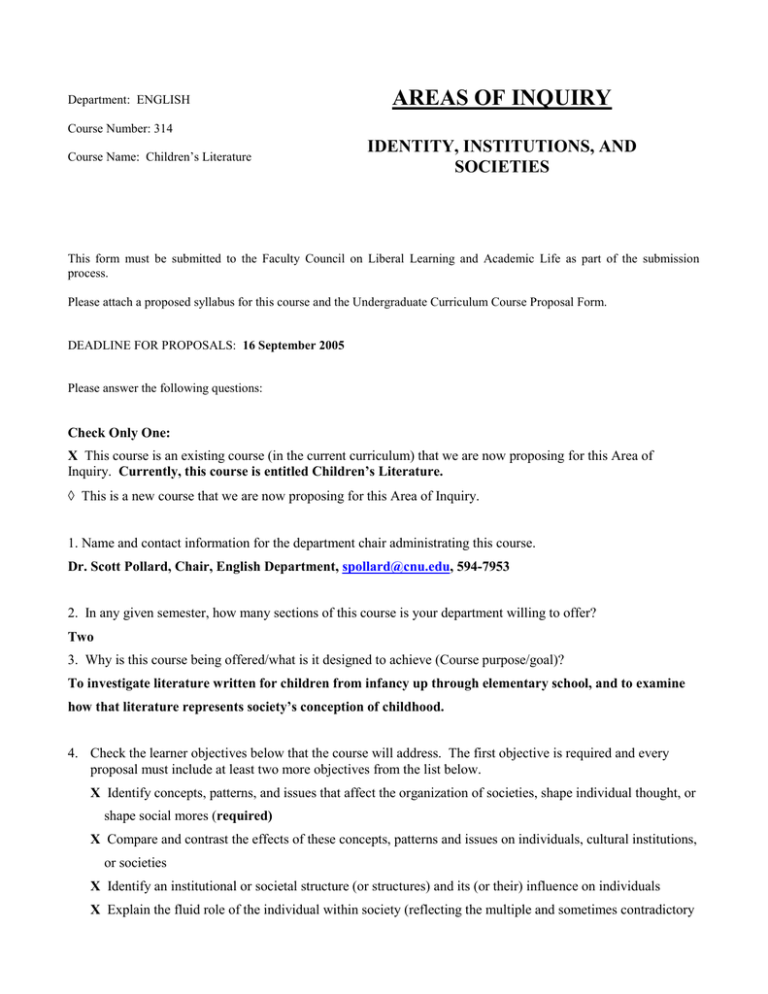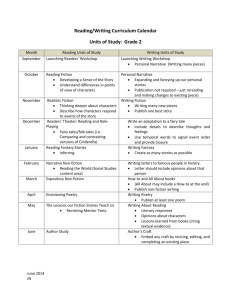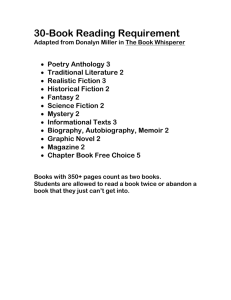AREAS OF INQUIRY IDENTITY, INSTITUTIONS, AND SOCIETIES
advertisement

Department: ENGLISH AREAS OF INQUIRY Course Number: 314 Course Name: Children’s Literature IDENTITY, INSTITUTIONS, AND SOCIETIES This form must be submitted to the Faculty Council on Liberal Learning and Academic Life as part of the submission process. Please attach a proposed syllabus for this course and the Undergraduate Curriculum Course Proposal Form. DEADLINE FOR PROPOSALS: 16 September 2005 Please answer the following questions: Check Only One: X This course is an existing course (in the current curriculum) that we are now proposing for this Area of Inquiry. Currently, this course is entitled Children’s Literature. This is a new course that we are now proposing for this Area of Inquiry. 1. Name and contact information for the department chair administrating this course. Dr. Scott Pollard, Chair, English Department, spollard@cnu.edu, 594-7953 2. In any given semester, how many sections of this course is your department willing to offer? Two 3. Why is this course being offered/what is it designed to achieve (Course purpose/goal)? To investigate literature written for children from infancy up through elementary school, and to examine how that literature represents society’s conception of childhood. 4. Check the learner objectives below that the course will address. The first objective is required and every proposal must include at least two more objectives from the list below. X Identify concepts, patterns, and issues that affect the organization of societies, shape individual thought, or shape social mores (required) X Compare and contrast the effects of these concepts, patterns and issues on individuals, cultural institutions, or societies X Identify an institutional or societal structure (or structures) and its (or their) influence on individuals X Explain the fluid role of the individual within society (reflecting the multiple and sometimes contradictory roles of individuals within society) X Recognize the influence of societal or cultural context on self and others as individuals ◊ Objectively and critically evaluate concepts of self and individuality 5. Briefly explain how this class addresses the above objectives. A course may cover more than three objectives. a.) The course examines the concept of childhood as a societal construct. Students engage in readings and discussion about whether childhood is an artificial or actual developmental stage, and how it is interpreted differently in different cultures. Literature about children is used as the focus of inquiry to examine how the societal patterns established for children play out in the social mores and roles that today’s American children assume. In addition to literature, students use their own experiences as children to question the construct of childhood. b.) The course addresses how American society has defined the role(s) of children, and how that has changed over time to shape thoughts, behaviors and expectations of children. Literature is examined as the vehicle to surface these thoughts, behaviors and expectations. Through reading both contemporary and historical fiction, the roles of the child in American society are explored. c.) The course addresses the ways in which children’s thoughts and behaviors are shaped by the cultural and social context around them. The experience of being an American child is sharply contrasted with the experiences of children in other parts of the world through literature examining the different cultures. Microcultures within American society (African American, Hispanic, or Native American) are also examined to surface the ways in which culture operates on the thoughts and actions of children. 6. Course Assessment: Identify how this course will accomplish the above objectives (choose at least one). X Participating in class discussion and debate Engaging in teamwork and other collaborative exercises X Writing analytical or evaluative papers, perhaps incorporating original research X Making oral presentations Creating an artistic product or a performance Participating in fieldwork Other means – please identify 7. Attach a proposed syllabus, which includes a statement of purpose, course objectives, and how these objectives will be accomplished. See attached. 8. Please identify and explain if this course contributes to the Foundations of Liberal Learning expectations for: Oral Communication Literacy: Allows for practice of oral communication literacy since students are required to give illustrator presentations. Information Literacy: Allows for practice of information literacy since students are introduced to and required to access various electronic sources for acquiring information about authors and literary criticism. Writing Literacy: Allows for continued practice of writing literacy as students prepare at least 12 informal journal responses and write two formal papers. 8. Explain how this course connects to Vision 2010 – the CNU Strategic Plan Goal A: The course provides an intellectual and challenging selection of reading about children and childhood. Goal B: The course requires critical and innovative thinking as it requires students to questions assumptions about their own experiences as a child, and to reconstruct how they might want childhood to function. Goal C: The course fosters independent learning, as it requires students to select works to read on their own Priority II: A culture of student learning and engagement Goal A: The course fosters commitment to culture, since students are exposed to plays, movies, or talks – as well as literature – supportive of the course content. Goal C: The course sustains and promotes a climate of intellectual engagement as students are required to read and discuss literature and how it relates to their lives. Submission Checklist: By the deadline, submit a packet with the following documents to the Assistant Dean for Liberal Learning. Please submit in electronic and hard copy form. ___X__ Area of Inquiry Course Proposal Form ___X__ Syllabus for the Course ___n/a__ Undergraduate Curriculum Committee Course Proposal Form Children's Literature English 314W Professor Kara K. Keeling Office: Ratcliffe 246 Office Hours: M-Th 2:00-4:00 and by appointment MW 4:00-5:15 Ratcliffe 106 Office: 594-7952 Dept: 594-7024 Home: 930-4253 email: kkeeling@cnu.edu TEXTS: Aardema, Verna. Why Mosquitoes Buzz in People's Ears. Babbitt, Natalie. Tuck Everlasting. DiCamillo, Kate. Because of Winn Dixie. Dorris, Michael. Guests. Fleischman, Paul. Seedfolks. Goble, Paul. The Girl Who Loved Wild Horses. Heins, Paul. Snow White. Huck, Charlotte. Princess Furball. Konisgburg, E.L. From the Mixed-Up Files of Mrs. Basil E. Frankweiler. Lester, Julius. John Henry. Levine, Gail Carson. Ella Enchanted. Munsch, Robert. The Paper Bag Princess. Prelutsky, Jack, ed. The Random House Book of Poetry for Children. Ringgold, Faith. Tar Beach. Rowling, J.K. Harry Potter and the Sorcerer's Stone. Sendak, Maurice. Where the Wild Things Are. Steptoe, John. Stevie. Young, Ed. Lon Po Po. Zelinsky, Paul. Rumplestiltskin. COURSE DESCRIPTION: An exploration of a representative sampling of literature written for children, focusing on the primary genres of children's books: picture books, fairy tales, fantasy, realistic fiction, and poetry. Not a course devoted to pedagogical concerns or techniques. COURSE OBJECTIVES: To introduce students as future professionals (teachers and librarians) to a wide variety of books for children; to teach students how to assess children’s books for quality through analysis and evaluation; to improve written communications skills through the practice of writing analyses of children’s books. To study children’s literature necessitates an examination of the concept of childhood as a societal construct. As we read books written for children, we will engage in readings and discussion about whether childhood is an artificial or actual developmental stage, and how it is interpreted differently in different cultures. We will inquire how the societal patterns established for children play out in the social mores and roles that children in these stories assume, and how such fictional roles invite the children who read the novels to assume specific roles. We will consider our own experiences as children to question the construct of childhood. Additionally, we will examine how American society has defined the role(s) of children, and how that has changed over time to shape thoughts, behaviors and expectations of children. By examining children’s books we will see how they serve as the vehicle to surface these thoughts, behaviors and expectations. Through reading both contemporary and historical fiction, the roles of the child in American society are explored. Finally, we will address the ways in which children’s thoughts and behaviors are shaped by the cultural and social context around them. The experience of being an American child can be compared and contrasted with the experiences of children in other parts of the world through literature that examines different cultures. The study of literary texts that represent the experiences of children from microcultures within American society (African American, Hispanic, or Native American) can show the ways in which culture operates on the thoughts and actions of children. REQUIREMENTS AND GRADING: Papers: 50%. You will write 2 papers in several drafts; each paper is worth 25% of your total grade. The first paper will be 3-5 pages long discussing a single text; the second will be 5-7 pages long, revising and expanding the first essay, adding one or two more texts for comparison and using outside sources. I will hand out topics to choose from, although I encourage you to develop your own topics as well. All papers are due at the beginning of class. I may give extensions if asked in advance (if you have a good reason), but I will deduct a full letter grade each day a paper is late. Don't miss class to finish papers! If you have difficulty printing a paper, you may submit an electronic copy by e-mail to verify that it was complete by the time it was due. You are still responsible for getting a hard copy to my mailbox by 10 am the next morning. I will only grade the hard copy; if you do not get it to me promptly, it will still count as late. Cumulative Final Exam: 15%. The exam will have three sections: short answer, covering the Essentials of Children's Literature readings; essay, covering the literature; and a second essay question that evaluates what you have learned this semester. Journal: 10%. You will write a weekly journal entry on the book(s) we discuss each week. Entries are due at the beginning of class the day we discuss the book. Please type your entries. You may write on whatever seems significant or troubling to you about the novels and picture books: I want to see you grappling with significant issues. Connect the books with the contexts that we set up in previous class discussions. Some students like treating the journal as a sounding board for potential lesson plans if they were to teach the book. You must come up with two discussion questions at the end of your journal entry (keep copies of the questions for during class discussion). They should be not be questions that ask for content information nor should they be answerable with a yes or no; they should be specific questions specific to this novel (not "what is the theme of this novel?"). This exercise is as useful to you as you make it: treat it like busy work and it will be. Quizzes and other short assignments: 5%. I will give short quizzes on our reading material. Quizzes will not be announced in advance, nor may they be made up. Read the entire chapter book for first day of discussion. Responses to talks, plays, films, etc. that are given on campus or within the community that relate to the course material will count toward this section of the grade. Other short writing assignments may also count toward this grade. Illustrator Presentation: 10%. You will research and write up and present an analysis of an assigned picture book illustrator. Be prepared to provide copies for the class and to present your findings. Participation: 10%. Because I will run this class as a discussion course, participation counts as 10% of your final grade as well. I define participation as including attendance and contributions to discussion. Attendance is required. I will not dock your final grade for 3 absences or fewer, but you will lose a point for every absence over that. You cannot pass the class if you miss more than 6 classes (2 weeks worth of class). Regular attendance without substantial contributions to discussion earns no more than an 7.5. Final Exam: Mon. Apr. 25, 5:00-7:30 Paper 1: Thesis: Outline: First Draft: Final Draft: Mon. Mon. Wed. Mon. 2/7 2/14 2/16 2/21 Paper 2: Thesis: Wed. 3/30 Outline Wed. 4/6 First Draft: Mon. 4/11 Final Draft: Wed. 4/13 Course Schedule Week 1: M 1/10 Introduction. What is children's literature? How do we know what is "literature"? W 1/12 Picture books--definitions, examples, Where the Wild Things Are. Course-pack. Journal 1 due: “What is children’s literature?” Week 2: M 1/17 Sendak and picture books. W 1/19 Picture books--lecture. Journal 2 due. Week 3: M 1/24 Multiculturalism: Stevie W 1/26 Multiculturalism: Tar Beach. Journal 3 due. Week 4: M 1/31 Historical Fiction and Multiculturalism: Guests (read whole book). W 2/2 Historical Fiction and Multiculturalism: Guests. Journal 4 due. Week 5: M 2/7 Contemporary Realistic Fiction: From the Mixed-up Files of Mrs. Basil E. Frankweiler. Thesis for Paper 1 due. W 2/9 Contemporary Realistic Fiction: From the Mixed-up Files of Mrs. Basil E. Frankweiler. Journal 5 due. Week 6: M 2/14 Contemporary Realistic Fiction: Because of Winn-Dixie. Outline for Paper 1 due. W 2/16 Draft 1 for Paper 1 due: editing workshop. Week 7: M 2/21 Fairy Tales: The Marriage Plot. Handout: “Ashputtle.” Online: "Cinderella," "Sleeping Beauty," "Rapunzel," "The Frog King," "Beauty and the Beast." Heins and Hyman’s Snow White. FINAL DRAFT OF PAPER 1 DUE. W 2/23 Fairy Tales: Variations on the Marriage Plot: Princess Furball. The Girl Who Loved Wild Horses. The Paper Bag Princess. Online: “The Swineherd. Journal 6 due. Week 8: M 2/28 SPRING BREAK: NO CLASS W 3/2 SPRING BREAK: NO CLASS Week 9: M 3/7 Fairy Tales: The Male Quest. John Henry. Online: "The Brave Little Tailor" "The Golden Goose," "Puss in Boots," "Jack and the Beanstalk," "The Twelve Dancing Princesses," "The Tinderbox." W 3/9 Fairy Tales: Child as Hero and Warnings. Online: "Hansel and Gretel," "Little Red Riding Hood," "Mother Holle," "Diamonds and Toads." Lon Po Po. Rumplestiltskin. Pourquoi Tales: the African story Why Mosquitoes Buzz in People's Ears. Critique 6 due. Journal 7 due. Week 10: M 3/14 Andersen's Literary Fairy Tales: "The Little Mermaid," "The Ugly Duckling," "The Emperor's New Clothes," "The Steadfast Tin Soldier," "The Little Match Girl," "The Nightingale." W 3/16 Disney. View Disney’s animated Little Mermaid and Cinderella on video/DVD on your own by this date. Journal 8 due. Week 11: M 3/21 Fantasy: Harry Potter and the Sorcerer's Stone. (Read whole book) W 3/23 Fantasy: Harry Potter and the Sorcerer's Stone. Journal 9 due. Week 12: M 3/28 Fantasy: Ella Enchanted. (Read whole book). W 3/30 Fantasy: Ella Enchanted. Thesis of Paper 2 due. Journal 10 due. Week 13: M 4/4 Time fantasy: Tuck Everlasting. W 4/6 Time fantasy: Tuck Everlasting. Outline of Paper 2 due. Journal 11 due. Week 14: M 4/11 Draft of Paper 2 due: peer editing workshop. W 4/13 FINAL DRAFT OF PAPER 2 DUE. Poetry: Nursery Rhymes (handout). Week 15: M 4/18 Illustrator Assignment due. W 4/20 Contemporary Realism: Seedfolks. How is “children’s literature audience” defined? Journal 12 due. Protocols and Advice 1. Come to class regularly & on time. Success depends on you being here. If you have doctor's appointments, etc. scheduled during this class, move them. Don't schedule them during this class during the term. Tell your employer you cannot work during this period for any reason. Your career (which depends on your academic work) is more important than a short-term job. 2. Visit me regularly to go over your writing. I am a cheap and available resource, so please use me. 3. Utilize class time fully: be prepared, keep up with the reading, participate, ask questions, and engage yourself. Lack of preparation and participation inevitably result in boredom. Don't be bored or boring! 4. Stay on schedule: keep up with the syllabus and hand in work when it is due. Meeting deadlines is essential for your success. 5. Show respect for you peers and learning. No distracting gum chewing, eating, note-passing, etc. 6. Bring your texts, paper to write on, and something with which to write. 7. Do NOT throw out ANY of your work--drafts of papers included. Save until next term. Alice F. Randall Writing Center: Located on the first floor of Ratcliffe, the Writing Center provides tutorials at no cost to students beyond your student fees. It helps ALL students, whatever their ability or their level of confidence, at whatever stage their paper os assignment is in. They can help with critiques as well as papers. Use this CNU service! Plagiarism: Don't. It is unethical and illegal to claim someone else's writing as your own. You will be flunked from the class if you do. All work you turn in to me is to be original, something you have generated, not copied from another person or source. All quotations AND IDEAS in papers from other sources, including summaries and paraphrases, MUST be properly documented according to the MLA style. IF YOU USE ANY INTERNET MATERIAL IN ANY ASSIGNMENT, YOU MUST CREDIT IT!!!!!! Copying from the internet without crediting the source is an Honor Code violation and will result in dismissal from class with a failing grade for the course. If you don't know how, come see me and I'll help you learn. All intentional violations of the honor code, whether plagiarism or cheating on tests and quizzes, will be dealt with severely. If you have a disability that may affect your performance in class, please come see me immediately to discuss your needs. In order to receive an accommodation, your disability must be on record in the Academic Advising Office (594-8763). You may bring drinks to class. No food. Use bathroom before class, not during it, unless you are pregnant or have an emergency. Save personal questions for after class, not during group work.

